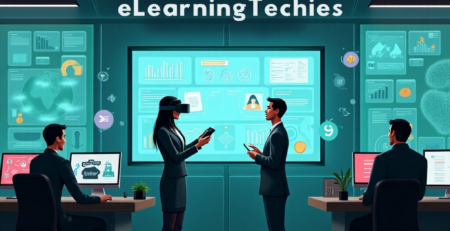Designing Effective Custom eLearning for Remote Teams
Remote work is here to stay. In a world where more than half of all companies offer flexible working arrangements, designing effective custom eLearning for remote teams is becoming a critical piece in the puzzle of modern workforce development. With the rise of technology and globalization, remote work has pushed teams and companies to adopt new and effective ways to engage and train their workforce.
Creating a tailored eLearning experience is not just about stringing together an array of lessons and quizzes. It’s about crafting an educational journey that resonates with your team’s unique needs. I’ve seen firsthand how a well-designed eLearning course can spark engagement and drive productivity among remote workers. Let’s explore how this can be achieved!
Why Custom eLearning Development Matters
In an age where information is abundant, it can be tempting to take a one-size-fits-all approach. However, the benefits of custom eLearning development are too significant to ignore. With bespoke courses, companies can:
Address Specific Needs: Tailor training materials to a team’s specific challenges or knowledge gaps.
Enhance Engagement: Increase relevance by using familiar scenarios and language, making the content more relatable and engaging.
Boost Retention: Customized content often leads to better understanding and retention.
According to a report by Deloitte, organizations that incorporate learning into day-to-day work achieve better business outcomes. But it’s not just about the content; it’s also about the tools and platform used. Choosing the right eLearning solutions provider and custom elearning development is vital in ensuring effective learning delivery.
Key Considerations in Custom eLearning Course Development
When developing an eLearning course for remote teams, there are several key factors to consider. Let’s delve into the central components which can significantly affect the outcome.
1. Identify Learning Objectives
Always begin with clear objectives. What do you want your remote team to achieve by the end of the course? Defining these goals upfront helps to steer the entire eLearning course development process. For instance, are you aiming to improve technical skills, enhance team collaboration, or introduce new company procedures?
2. Choose the Right Tools
Selecting the right tools is crucial in delivering effective eLearning. The use of platforms like Articulate Storyline or services from experienced elearning developers can make a substantial difference. When choosing a tool or an elearning provider, consider:
Ease of use for both developers and learners.
Flexibility to customize courses according to your team’s needs.
Integration capabilities with other apps and systems your team uses.
3. Create Engaging Content
Content is king, especially when it comes to remote learning. Use a mix of media—videos, quizzes, simulations—to cater to different learning styles. Interactive elements not only make learning fun but also reinforce concepts through application.
Moreover, feedback from eLearning companies shows that personalizing content for your audience increases engagement rates significantly. Make the training relevant to their roles and experiences.
4. Test and Iterate
Continuous improvement is the key to success. After deploying your eLearning solution, gather feedback from the participants. What worked well? What didn’t? Adjust and iterate on the content to better fit your remote team’s evolving needs.
Partnering with the Right eLearning Solutions Provider
Choosing an effective eLearning provider can determine the success of your custom eLearning solution. Reputable elearning companies will work closely with you to understand your objectives and tailor their services to meet your needs. They can provide expert articulate storyline developers to bring your vision to life.
When evaluating potential partners, consider:
Experience and expertise in developing custom eLearning solutions.
Client testimonials and case studies to gauge past performance.
Support and maintenance services post-deployment.
Conclusion: Enhancing Remote Learning Experiences
Creating impactful eLearning experiences for remote teams is more than just transferring content online. It’s an evolving process that requires thoughtful planning and execution. By understanding your team’s needs, leveraging innovative tools, and partnering with the right eLearning developers, you can create a dynamic and personalized learning journey that aligns with your organizational goals.
For companies committed to the success of their remote teams, investing in custom eLearning development is a strategic move that can yield significant advantages. Keep learning, keep growing, and most importantly, keep innovating your approach to remote training!
Embrace the unique challenges and opportunities of remote work by designing engaging and efficient custom eLearning for your team. As someone who has walked this path, I can assure you—it’s more than worth the effort!












Leave a Reply